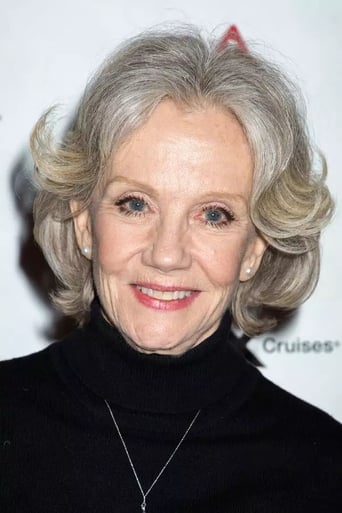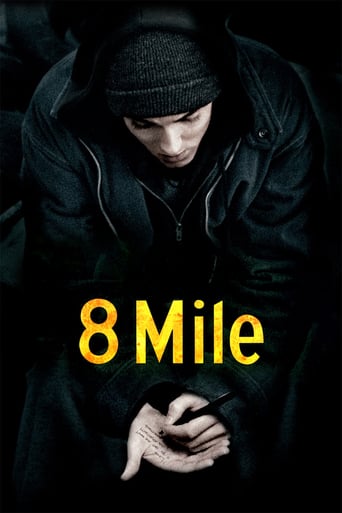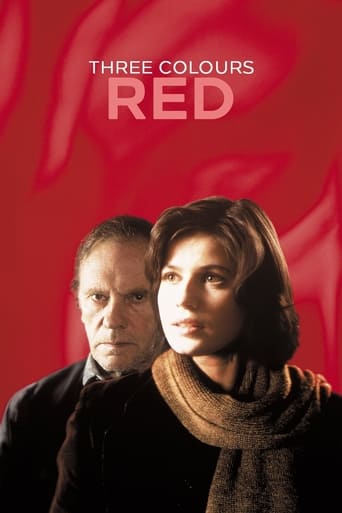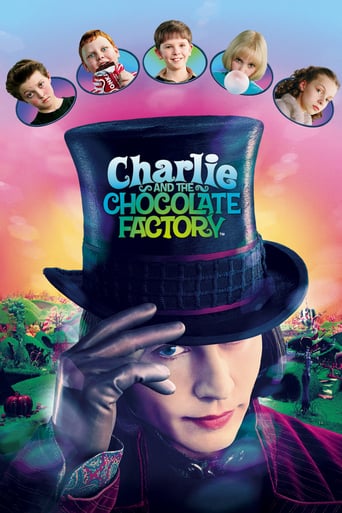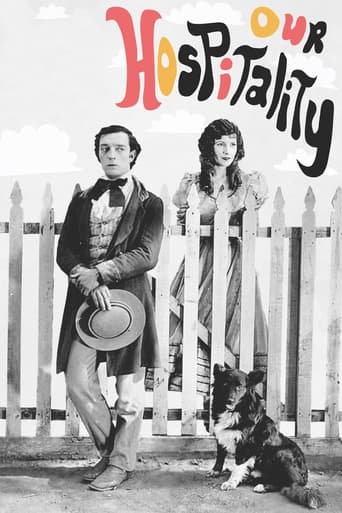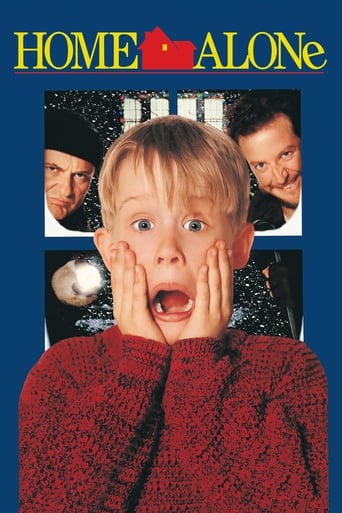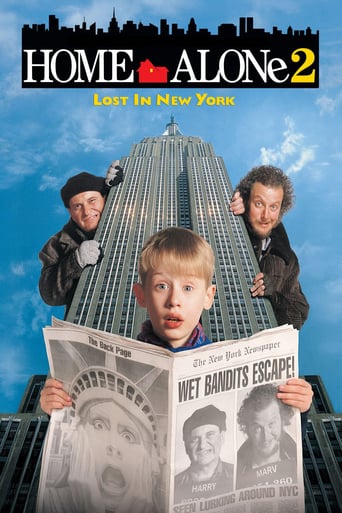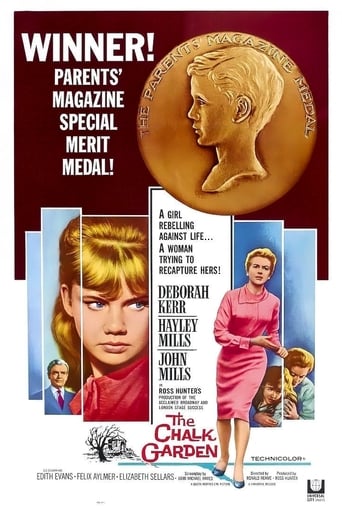
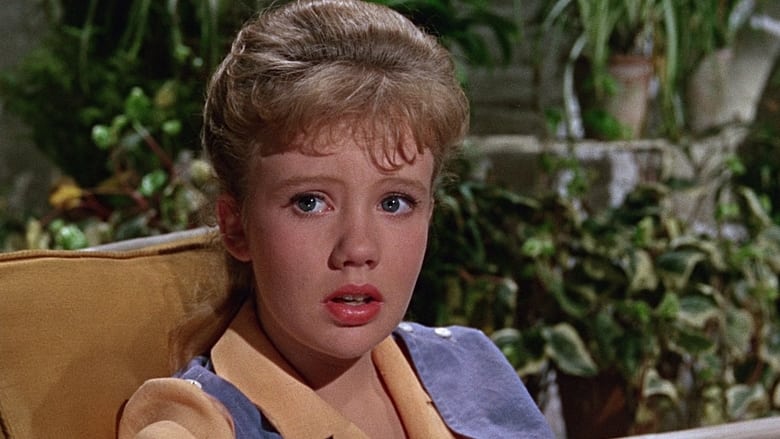
The Chalk Garden (1964)
A grandmother seeks a governess for her 16 year old granddaughter, Laurel, who manages to drive away each and every one so far by exposing their past, with a record of three in one week! When an applicant with a mysterious past manages to get the job, Laurel vows to expose her. Meanwhile, Laurel's married-divorced-married mother tries to get her back.
Watch Trailer
Cast


Similar titles
Reviews
This is a very odd and obscure film, but with major star names like John Mills, Hayley Mills, Edith Evans and Deborah Kerr, it's hard to understand why it's very little known. I guess this might be due to the fact that it doesn't fit into any simple category. The plot tells the tale of a troubled (i.e, bratty) teenager who scares off all her governesses until the enigmatic Miss Madrigal comes to stay. A small scale battle of wits begins to play out, until the situation reaches a climax and various secrets are revealed.So basically we have a two-hander between Deborah Kerr as the governess/substitute mother figure and Hayley Mills as the annoying daughter, which would seem to categorise this as a soap opera, and really thats all it really amounts too. Having said that, I really enjoyed watching it. The film benefits mainly from the performances of it's two leads, with Kerr poker-faced and icy as the governess, and Hayley Mills skillfully managing not to alienate the viewers affections with her portrayal of the out of control girl. Kerr has all the best lines, with some very smart comebacks to Mills nosey questioning, in fact the whole script is well written with a lot of very natural sounding dialogue. The settings don't stray much from the house and a nearby beach, which gives away the movie's origins as a play - I could see exactly how this would have been staged in a theatre. Luckily the filming is well handled, with some nice lighting and camera angles, even if some of the outdoor scenery look a bit artificial - however I honestly could not tell if that beach was a real or a set! I would recommend this for the strong performances, especially if any of the cast I have listed above are favourites of yours - and the script - but it's really only Saturday afternoon matinée material as the plot is hardly earth-shattering. A neat metaphor using the concept of flowers growing in a chalk garden rounds it off nicely.
"The Chalk Garden" is a largely forgotten screen treasure. It focuses on Laurel, a troubled 16-year-old who moved in with her grandmother, Mrs. St. Maugham, in protest against her mother's re-marriage. Mrs. St. Maugham hired various governesses to deal with Laurel; but the young girl quickly drove them away. They failed to comprehend her; but she discovered their deepest secrets, and immediately conveyed these to her grandmother, leading to the dismissals of a succession of governesses. When Mrs. St. Maugham hires Miss Madrigal as the new governess, the tables are turned. Laurel cannot figure out Madrigal—an enigmatic figure, who, although almost aristocratic in bearing, is unable to provide any references. But Madrigal completely comprehends Laurel at once. Olivia, Laurel's mother, plans to reclaim custody of her daughter; but Mrs. St. Maugham is determined to prevent this. Meanwhile, Maitland, the butler/general factotum, tries to keep the household on an even keel.That there is a certain complexity to each of these characters adds credibility and interest to the story. Laurel is a highly inquisitive, intelligent, and analytical person, whose judgments are sometimes very perceptive. Often disrespectful and occasionally obnoxious, in private, Laurel is tormented by loneliness and grief. Mrs. St. Maugham is a generous but domineering woman—she wants the best for Olivia, but feels compelled to impose her choices on her daughter. And Maitland is recovering from his own personal tragedy.There are some weaknesses in the screenplay. In an early scene, Laurel urges Madrigal to smile more because she is beautiful when she smiles, then comments that Madrigal is "quite accomplished" as an artist, and then indicates that she values the governess' compliments about her own painting. It appears that there is in Laurel's view of Madrigal an element of admiration that she had not felt for her other governesses. But the screenplay does not develop Laurel's ambivalent feelings, although these are an important part of the story. Similarly, Olivia's maternal feelings are not much in evidence. We see Olivia primarily in confrontation with her mother. For four years, she has failed to contest custody of Laurel, for reasons that are not satisfactorily explained. Even now, Olivia says she is trying to regain Laurel because she is "my daughter, not yours"—which suggests there is an element of competition as well as compassion in her custody battle. Finally, the screenplay makes an effort to soften Madrigal's past. This weakens the plot. If Madrigal's travails resulted only from a failure of the justice system, what is the relevance of her experience for Laurel's situation? But the script is fundamentally strong. It stimulates concern about Laurel and weaves an air of mystery around Madrigal. It also limns the personalities of the principal characters, and shows how the outcome of the story has implications for all of them. Adult viewers may find themselves waiting to see who will finally tame the troubled teenager. But, in a rather sudden and surprising fashion, Laurel's obnoxious façade is cracked when her own machinations reveal Madrigal's mysterious past. Following this event, a series of carefully crafted dialogs, each with a somewhat unexpected outcome, take the story to its conclusion.Undoubtedly, the greatest strength of "The Chalk Garden" is its world-class cast. And, in view of the extreme close-up photography in the most emotional moments, the actors had to master the tiniest details of their performances. This is the cast you might have assembled if you got your first choice of the actor for each role. Edith Evans (nominated for three Academy Awards from 1963-1967) as Mrs. St. Maugham, and Deborah Kerr (nominated for five Academy Awards from 1953-1960) as Madrigal, were ideal for the roles of the aristocratic elderly British lady and the reserved governess. Many actors could have portrayed an English butler, but, as Maitland, John Mills could also draw on varied talents to toss off insouciant comments to potential governesses and Mrs. Madrigal, and even engage in a physical confrontation with Laurel. The great gamble was to cast Hayley Mills as Laurel. Other cast members had years of experience and had played similar roles in the past. Although she had been nominated for two Academy Awards and had received a special honorary Academy Award, Ms. Mills was only 17, and had never portrayed anyone remotely like Laurel. She must have found certain scenes hugely challenging, as some required her to show almost every emotion and to give credibility to seemingly irrational mood swings. In this reviewers' opinion, it is perhaps her best on-screen performance, and should be required viewing for those who think Mills could portray only Pollyanna-type characters. Felix Aylmer, who had played many "gray eminence" roles, does well as Judge McWhirrey. But, as noted above, Elizabeth Sellars' performance as Olivia, is cramped by the script.The DVD version comes without peripherals, but (fortunately) is in 1.85:1 format. A pan-and-scan version would have been a disaster.
Based on a play by Enid Bagnold, THE CHALK GARDEN is the story of the need to bring love - real love - to children. Deborah Kerr is Miss Madrigal, a newly hired nanny/companion at the home of Mrs. St. Maugham (Edith Evans), a wealthy and slightly eccentric old woman who has been at war with her daughter Olivia (Elizabeth Sellars) for some time. Olivia has a daughter Laurel (Hayley Mills) who has emotional problems, and whom Mrs. St. Maugham has legally taken away from Olivia. The old lady pretends that only she can give the love and care to the girl that her own daughter fails to give, but in reality she allows Laurel to have full freedom. As Laurel is an arsonist and liar this is not the best policy. The household is completed by the wryly humorous butler Maitland (John Mills). He sees the blundering by his employer, and he would like to tell a few things to Laurel, but he restrains himself because of his status as an employee.Madrigal, of course, having just arrived is more willing to openly confront Laurel. She does so in an effort to understand her. Laurel appreciates having a new person to toy with, and opens up to an extent (revealing a love of old murder cases), but she is trying to find out the secret that Madrigal is holding back on - which she assumes can prove quite wounding if exposed, and she would love to expose it.At points the secret comes near to the surface, but it keeps getting closed as quickly as it seems to appear. In the meantime Madrigal tries to get her employer see the need for Laurel to have her mother back into her life, and even gets Olivia into the house at one point. This does not sit well with Mrs. St. Maugham.The explosion finally occurs when a friend of Mrs. St. Maugham, Justice McWhirry, comes for a visit encouraged by a malicious Laurel. What result is too much even for the young girl, who learns that some matters should remain secrets.I saw this fine film at Radio City in 1964, but I imagine my parents took me and my sister there because Hayley Mills was given star treatment in the newspapers for this film. At that time, due to her string of movies with Walt Disney like POLLYANNA, the reference to Mills' name in any movie to an American audience suggested a "kid's flick". That she had started her career with TIGER BAY (also with her father John and Holst Bucholst) regarding a young girl helping a young man trying to avoid arrest for murder was relatively unknown - that film, like THE CHALK GARDEN, was made in England. Only Hayley's American films like THE PARENT TRAP (again with Disney) were for kids. The subject matter here, on what damage can be done to a young child by warring adults and lack of needed affection, was not ignored by Disney but was usually sugar coated somehow. Films like THE CHALK GARDEN did not sugar coat the subject matter, and so they did not do as well with American audiences as British ones. If you see this one listed on Turner Classics grab it. Hayley gives a fine performance as a malevolent and sharp imp. Kerr holds her own as the woman who offers help but is heavily handicapped. Evans (after a great West End stage career) began really coming into films in the late 1940s, but in sharp character roles like in THE IMPORTANCE OF BEING EARNEST or TOM JONES or THE QUEEN OF SPADES. It was a later entrance than Peggy Ashcroft's or John Guilgud's, but it proved highly rewarding. John Mills is excellent as usual in his role of the wiser but (by social situation) quieter butler (who finally does get his moment to tell off Laurel). Sellars has a shorter role than one would like, but makes the most of it confronting Evans. And my old favorite Aylmer has a moment of recognition that few Judges like to ever experience.
It is a film about lies, stories untold, and murder. We enter seeing things one way and then at the end see it another. I am a MAJOR Hayley Mills fan and when I saw this on the AMC channel, I just had to see it. What a movie! It got drawn into it and was held to the end. Deborah Karr plays the role of a new/temp governess of a mean spirited child(Hayley) who can do nothing but lie. Something Deborah's character has in common. We watch as they both try to wear each other down. I was a little surprised to see Hayley bite into a role so unlike her others, and see how well she does. Deborah gives a great performance here as does John Mills(Hayley's real dad) as the caretaker. The one who really steals the show is (Dame)Edith Evans. She is fantastic. It's hard to believe that she is older than her character, yet they had to age her for the film so she would look old enough for the role!



